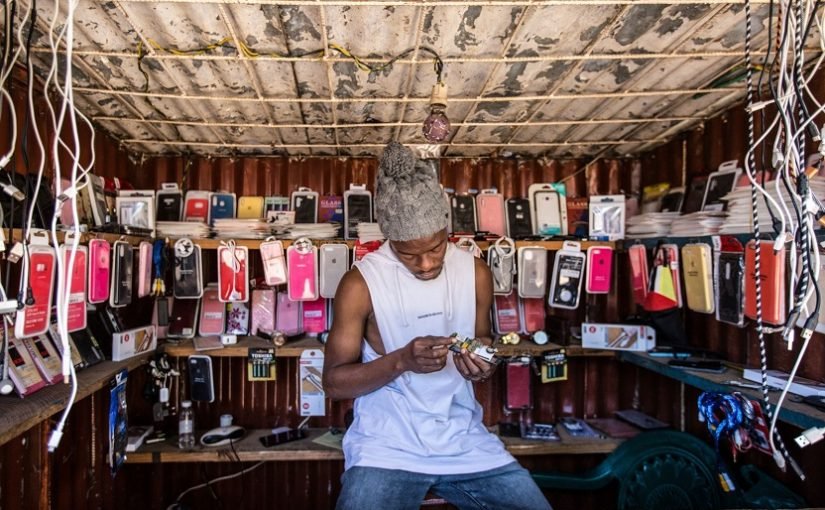
Sustainability strategy
Foxway 2028 Vision
Authentically sustainable.
Growing by degrowing the industry.
Foxway operates in the technology sector, focusing directly on the concept of circular tech. Rather than perpetuating the traditional linear economic model – where devices are manufactured, used, and discarded – Foxway addresses the growing environmental and social challenges posed by the mass production and consumption of technology through our circular business model. By extending the device lifecycles and reducing waste, we aim to create a more responsible technology ecosystem.
Authentically Sustainable
Foxway’s 2028 Sustainability Vision
Grounded in Reality
Our sustainability strategy is rooted in a realistic understanding of the physical environment we operate in — a world with finite resources. We are moving beyond sustainability as a mere compliance issue, regulatory requirement, risk management perspective or a simple marketing tool. Instead:
We aim to hardcode sustainability into our business strategy in a way that also aims to transform the surrounding system
Rather than retrofitting sustainability into an inherently unsustainable system, we strive to be part of a growing movement for systemic change – where sustainability and value creation go hand in hand, connecting new economic thinking with business action.
A Circular, Degrowth-Oriented Future
We aim to establish ourselves as an authentically sustainable circular-tech company, aligned with degrowth principles – particularly in addressing the harmful aspects of the tech industry. Our approach to degrowth focuses on reducing:excess, unnecessary consumption
Excess, unnecessary consumption
Production and consumption of cheap, short-lived devices that are discarded after just 2–3 years. Instead, we advocate for sustainable tech choices that prioritize durability and longer lifespans.
Premature planned obsolescence
Exploitative industry practices – especially those at the beginning of the supply chain, where workers are stripped of dignity and forced to labor in inhumane conditions in artisanal mines
In essence, our vision calls for an end to mindless consumerism and a shift in the tech sector toward greater circularity, reducing reliance on virgin resources. Degrowth is not a radical political agenda but, in the words of Triodos Bank Chief Economist Hans Stegeman, “a pragmatic economic policy in times of increasing scarcity,” focused on reducing excess consumption and unnecessary waste.
In our view, it’s a business continuity imperative. But for it to work, we need not just focus on ourselves, but rather try to shift the whole market so that business overall can profit from transition to a circular economy, which operates within planetary boundaries and aligns with the realities of a resource-constrained world.
As degrowth and post-growth paradigms gain momentum – supported by thought leaders, scientists, policymakers, and organizations like the IPCC – Foxway has a unique opportunity to champion this approach in the corporate world, advocating for a genuinely sustainable model of tech consumption.
Circularity x Sufficiency
As economist Tim Jackson wisely noted, “More is only better when there’s not enough.” This perspective is critical when examining today’s consumerism patterns. While individual choices matter, businesses – including ours – have played a central role in driving the endless cycle of consumption. To break this, we need to shift to a sufficiency paradigm that prioritizes high-quality products designed for longevity and ease of repair.
Sufficiency measures fall into two categories:
Avoiding unnecessary and excessive consumption.
Shifting from environmentally intensive products to low-impact alternatives.
or us, this means adopting circular Device-as-a-Service (DaaS) business models instead of linear sales, and offering refurbished devices. Refurbished products carry a much smaller environmental footprint compared to new ones (check our Handprint reports for specific numbers).
Sustainability Anchored in Business, Founded on
Realistic Expectations
High-income countries have long adopted unsustainable consumption patterns, pushing us into ecological overshoot. We recognize that the planet simply doesn’t have the resources to support this level of wasteful behavior, and so we anchor ourselves in the understanding that consumption must change.
Accountability Over Accounting
Rather than getting lost in the numbers or relying solely on public disclosures to drive change, we prioritize real accountability. Mainstream sustainability efforts often focus on reporting and compliance, with the belief that transparency will lead to better outcomes. But this hasn’t worked so far. We focus on systemic foresight and aligning our business strategy with meaningful action, rather than chasing arbitrary ESG ratings or frameworks. Our goal is to make a genuine difference, not to tick boxes or inflate our standing on sustainability platforms.
Transparency
Authenticity is key. We believe in owning our entire value chain, including the difficult parts. We’re not here to point fingers, but we do not want to gloss over the externalities of our industry. Transparency allows us to address our challenges openly and work toward true systemic change.

Introducing Concepts
The circular
economy 5 R’s
The first step in the circular economy is to refuse products and materials that are not sustainable, opting for alternatives that generate less waste or none at all.
We aim to reduce our consumption and the amount of resources used, thereby minimizing waste production and the strain on natural ecosystems.
Refuse: The first step in the circular economy is to refuse products and materials that are not sustainable, opting for alternatives that generate less waste or none at all.
Reduce: We aim to reduce consumption and the amount of resources used, minimizing waste production and easing the strain on natural ecosystems.
Reuse: By focusing on reuse, we extend the lifespan of products by finding ways to use them again rather than discarding them after a single use.
Repurpose: Through repurposing, materials or products are adapted for a different use, giving new life to items that might otherwise be thrown away.
Recycle: Finally, recycling involves processing materials to make new products, reducing the need for raw resources and diverting waste from landfills.
Degrowth
Degrowth is an economic and philosophical concept that advocates for a deliberate reduction in production and consumption to achieve ecological sustainability, social equity, and human well-being. Rooted in critiques of neoliberal economics and continuous growth models, degrowth emphasizes the need to reframe human progress away from increasing economic output and toward ecological health, wealth redistribution, and the nurturing of local communities. Scholars like Serge Latouche and Tim Jackson argue that perpetual growth is incompatible with finite planetary resources and that societal well-being can be enhanced through a focus on sufficiency, frugality, and the reduction of material throughput. Degrowth envisions a systemic transformation in how economies are structured, prioritizing ecological balance and reducing excessive consumption, rather than relying on technological innovations to solve environmental crises.
In the context of technology, degrowth principles emphasize a shift from extractive, linear production processes to regenerative systems that minimize waste and resource use. Circular tech incorporates strategies like recycling, upcycling, and product longevity to reduce the environmental impacts of production and consumption. Instead of pursuing economic growth through the production of new technologies, degrowth-inspired circular technology focuses on resource efficiency, repairability, and local production networks. This aligns with the philosophical underpinnings of degrowth by encouraging a reduction in material consumption while fostering sustainable technological innovation that benefits both society and the environment. Academic studies in fields like ecological economics and industrial ecology further explore how degrowth-inspired approaches to technology can reduce ecological footprints while promoting greater social and environmental justice (Kallis et al., 2018).
Circularity
Often referred to as the circular economy, circularity is a concept rooted in sustainability philosophy. It aims to minimize waste and maximize resource use by creating closed-loop systems.
Unlike the traditional linear economic model of "take, make, dispose," circularity emphasizes designing products and processes that preserve the value of materials and resources for as long as possible. The goal is to regenerate natural systems, extend product lifecycles, and reduce environmental degradation by promoting repair, refurbishment, and reuse.
"Unlike the traditional linear economic model of "take, make, dispose," circularity emphasizes designing products and processes that preserve the value of materials and resources for as long as possible. The goal is to regenerate natural systems, extend product lifecycles, and reduce environmental degradation by promoting repair, refurbishment, and reuse. Conceptually, it draws from systems thinking, where the economy is viewed as part of a larger ecological system. Scholars such as Ken Webster and Walter Stahel have argued that circularity is not merely a technical fix, but also a shift in economic mindset—one that reorients economies toward long-term resilience, resource sufficiency, and environmental regeneration (Stahel, 2016).
When applied to technology and mass production in the global economy, circularity encourages companies to rethink how technology is designed, manufactured, and consumed. Mass production, traditionally driven by economies of scale and planned obsolescence, has led to the over-extraction of raw materials, energy-intensive processes, and large amounts of e-waste. Circular strategies challenge this model by promoting modular design, product life extension, and innovations in recycling. For instance, companies are increasingly adopting practices like designing for disassembly, where products are created with materials that can be easily recovered and reused at the end of their lifecycle. Furthermore, the rise of the "right to repair" movement aligns with circularity by countering the built-in disposability of tech products and favoring durability and accessibility.In the current global economy, the application of circularity to technology mass production is gaining traction, particularly in response to resource scarcity and environmental concerns. Original Equipment Manufacturers (OEMs) have introduced recycling programs and adopted sustainable design practices, but the challenge remains in scaling these practices across industries and markets.
As scholars such as Murray et al. (2017) note, while circularity offers a promising pathway toward sustainable production, it also requires deep systemic changes in global supply chains, policy frameworks, and consumer behavior. Without addressing the economic structures that incentivize overproduction and consumption, the circular economy risks becoming a limited solution within a fundamentally growth-driven paradigm.

Computers, mobile phones, and other devices often have a technical lifespan that far exceeds their commercial value or relevance to operating systems.
Historically, user preferences and rapid innovation cycles have taken precedence over sustainability. However, organizations and individuals are increasingly prioritizing efforts to minimize their environmental footprint. At Foxway, we target to provide a holistic perspective on the value chain, empowering and guiding companies and communities to make informed, sustainable choices. By delivering circular tech services to large organizations, the public sector, and the recommerce industry, we champion a more responsible approach to technology. Through recovery, refurbishment, remarketing, and the creation of robust infrastructure for technology reuse, we promote a circular and sufficieny based tech ecosystem. Our goal is to reduce the negative environmental impact of the tech industry while maximizing the value of existing resources.
Foxway’s environmental vision and sustainability strategy are based on the principles of degrowth and circularity for the tech industry. By extending product lifespans, reducing e-waste, and enhancing resource efficiency, we align with global sustainability goals and actively work to mitigate the environmental costs of new technology production. Through advocating for responsible consumption and resource stewardship, we play a critical role in advancing the circular economy and fostering a more sustainable future for our planet.
“SBTi & Foxway’s Carbon Footprint Mitigation Strategy
At Foxway, we are committed to accountability, not just accounting. In line with this, we submitted our climate action targets to the Science Based Targets initiative (SBTi) in October 2023, which were validated in May 2024. However, we have observed a concerning trend in 2024, as many companies with SBTi approval have failed to meet their commitments. This highlights a broader issue: despite initiatives like the SBTi and the Paris Agreement, efforts to combat climate change are still insufficient.
To ensure we meet our targets, we have implemented a comprehensive carbon reduction plan that focuses primarily on our own actions, rather than waiting for a “miracle” to happen or relying solely on manufacturers to decarbonize. Over the past ten years, very few vendors have succeeded in significantly reducing the average carbon footprint of their main products, such as mobiles and laptops. Nevertheless, there are good examples, and we are dedicated to supporting and promoting those products that combine low carbon emissions with longevity.
Our Carbon Reduction Plan: Facing Obvious Challenges
Foxway has developed a robust carbon reduction plan to help us achieve our short-term goals while advancing toward our long-term objectives. However, given the continued global demand for tech products, which rely on raw material extraction, transportation, and complex manufacturing processes, a true net-zero scenario is not yet achievable while introducing new products to the market. The global dependency on fossil-based energy is still increasing, and while renewables are being added into the power mix, they are not replacing fossil fuels. Furthermore, the energy demand for power technology is rising rapidly, with data centers alone projected to increase global energy consumption by an amount equivalent to Japan’s total annual energy usage each year.
These factors make reaching net-zero targets even more challenging. Nonetheless, we are committed to monitoring and transparently reporting our emissions profile, including Scope 3 emissions.
To reduce our footprint, Foxway focuses on the following key areas:
Achieving 100% renewable electricity usage, with verified REC certificates.
Converting our fleet to electric vehicles.
Collaborating with logistics partners and customers to minimize air transport and prioritize low-carbon land and sea shipping.
Encouraging customers to purchase renewable energy.
Prioritizing the sale of second-hand devices.
Phasing out high-carbon footprint products in line with our carbon reduction plan.
Our carbon reduction plan can be found here.
Our SBTi-Validated Carbon Reduction Targets
However, SBTi is not without its challenges. One critique is the long timeline to reach net zero by 2050, which may create a false sense of security, potentially delaying decarbonization efforts as companies, including us, assume there is ample time to act. While committing to net zero demonstrates intent and can influence suppliers and partners to prioritize decarbonization, it can also risk deferring urgent action without concrete, immediate plans. In this sense, net zero is a "double-edged sword"—it builds awareness and ambition but must be paired with decisive steps now.
Reduce absolute Scope 1 and 2 GHG emissions by 42% by 2030, from a 2022 base year.
Reduce absolute Scope 3 GHG emissions by 25% by 2030, from a 2022 base year.
Increase renewable electricity sourcing to 100% by 2030 (up from 48.9% in 2022).
Reduce Scope 1, 2, and 3 emissions by 90% by 2050, from a 2022 base year.
Most corporate sustainability frameworks use relative metrics, which only measure performance against historical results or industry benchmarks without addressing real-world sustainability—specifically, whether we are operating within the safe space of planetary boundaries. SBTi is the only global standard-setting body that tackles this issue by providing absolute targets, not relative ones. As strong proponents of science-based approaches and sustainability aligned with real-world limits, we are proud to have our GHG emissions targets validated by SBTi.
Our Offering and Go-to-Market Strategy
As a customer or partner of Foxway, you can expect open and straightforward dialogue, where we work together to minimize the environmental footprint of your tech needs. This approach is a core part of our "degrowing the industry" strategy, which integrates the principles of circularity and sufficiency.
Circularity x Sufficiency
In practice, our commitment to circularity and sufficiency translates to the following actions:
From 2025: We will not enter any new agreements involving linear supply and demand models for new devices.
As-a-Service Agreements: We will prioritize as-a-service agreements to drive the circular economy, focusing on longevity, transparency, and customer-adapted flexibility.
Take-Back Programs: For customers opting out of as-a-service models, we will mandate take-back programs (ITAD services) to ensure devices stay within a circular flow.
Fair Trade-In and ITAD Programs: We will consistently offer fair trade-in and ITAD programs to all partners and customers.
No “Scrap” Devices: We will refuse to sell or offer short-life, low-quality devices (e.g., budget school laptops) with minimal second-use potential.
Responsible Marketing: We will avoid consumerist marketing tactics or promotional triggers, such as "unboxing" experiences or "buy one, get one free" deals.
Transparency Over Labels: Instead of relying on feel-good labels, ratings, or certificates, we will engage in honest discussions about our supply chain, collaborating with partners to tackle and mitigate challenges.
Sustainable Packaging: We will ensure all packaging aligns with EU taxonomy standards.
For an overview of all our quantitative ESG targets, read our “ESG Commitments” document.

Circularity within a degrowth framework emphasizes reducing overall material and energy use, focusing on repair, reuse, and the longevity of products, rather than simply recycling within a system that still promotes consumption and growth.
Giorgos Kallis, Susan Paulson in The Case for Degrowth
Double Materiality Analysis
Stakeholder Interaction in a New Way
Stakeholder engagement has gained new momentum in recent years, especially since the EU introduced stricter regulations requiring all large enterprises to perform comprehensive double materiality analyses (DMA). This approach goes beyond traditional financial disclosures by considering two perspectives: financial materiality, which focuses on how environmental, social, and governance (ESG) factors affect a company’s financial performance, and impact materiality, which assesses the company’s own impact on society and the environment. Unfortunately, the promising opportunity to delve into impact materiality has not been fully leveraged. Foxway, like most of the tech companies we’ve investigated, has relied on traditional methods such as desktop analyses and interviews with clients, suppliers, employees, and NGOs. At best, a roundtable discussion is included, often covering familiar topics and questions without significant depth. These efforts are later reported as successes, and reporting practices continue largely unchanged.
The CSRD and ESRS make it clear: affected stakeholders must be properly identified and considered
As highlighted in the section “The Real Cost of Tech,” our primary stakeholder is the planet and the people who inhabit it—especially those who bear the negative impacts of our value chain. The United Nations reports that modern slavery is at an all-time high, with an estimated 50 million people currently living in conditions of enslavement.
Alongside this, the tech industry’s demand for key minerals has intensified the harmful “side-effects” of tech production – wars over access to resources, poor living conditions near mining sites, and the prevalence of child labour.Transparency is decreasing at the same pace as the hunt for critical minerals accelerates—driven by the chip and tech industries, the green transition, and military and security needs—making these issues harder to address.
We can no longer be on stage claiming all is well while relying on industry-aligned NGOs, suppliers, and a select group of agreeable partners and customers to define our material impacts. It’s time to make a genuine effort toward honest, proper analysis.
In 2025, Foxway aims to launch a new platform for stakeholder engagement, accessible to everyone in the industry. Built on principles of transparency, scientific rigor, and integrity, this platform will foster open collaboration to address crucial issues. We strive for success; however, if we fall short, Foxway will still commit to sharing our insights openly and engaging more deeply with the core question:
is the true cost of tech, and how can we mitigate its negative impacts on people, climate, and biodiversity?

